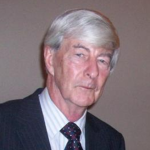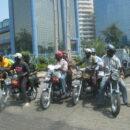Peace, Justice, and the International Criminal Court
The long-running debate about whether seeking justice for grave international crimes interferes with prospects for peace has intensified as the possibility of national leaders being brought to trial for human rights violations becomes more likely. The International Criminal Court (ICC), which is mandated to investigate and prosecute war crimes, crimes against humanity, and genocide, began operations in 2003 and has already issued its first arrest warrant for a sitting head of state””Sudan’s President Omar al-Bashir. That the ICC operates while armed conflicts are ongoing fuels the justice versus peace debate.
Notwithstanding the general recognition that international law obliges countries to prosecute genocide, crimes against humanity, and war crimes, some diplomats tasked with negotiating peace agreements have argued that the prospect of prosecution by the ICC has made achieving their objectives more difficult.[1] Those negotiating peace have tended to view the possibility of prosecution as a dangerous and unfortunate obstacle to their work. Some fear that merely raising the spectre of prosecution will bring an end to fragile peace talks. The temptation to suspend justice in exchange for promises to end a conflict has already arisen with respect to the ICC’s work in Darfur and Uganda, and threatens to recur in coming years as parties and mediators struggle to negotiate peace deals.
In the short term, it is easy to understand the temptation to forego justice in an effort to end armed conflict. However, Human Rights Watch’s (HRW) research demonstrates that a decision to ignore atrocities and to reinforce a culture of impunity may carry a high price. Indeed, instead of impeding negotiations or stalling a peaceful transition, remaining firm on the importance of justice “” or at least leaving the possibility for justice open, whether meted out by national or international prosecutions “” can yield short- and long-term benefits. HRW findings about the relationship between peace and justice are discussed at length in a July 2009 report “Selling Justice Short: Why Accountability Matters for Peace.” While there are many factors that influence the resumption of armed conflict, and we do not assert that impunity is the sole causal factor, a review of HRW experience shows that the impact of justice is too often undervalued when weighing objectives in resolving a conflict.
Case studies in the HRW 2009 report are drawn from 20 years of research in as many countries. The ICC’s reach has understandably been more limited to date. Six years after the court’s operations began, its prosecutor is carrying out investigations in four situations (Uganda; Democratic Republic of Congo; Central African Republic; and Darfur, Sudan) and the ICC’s first trial began in January 2009. The prosecutor’s request to open a fifth investigation””in Kenya””is pending before a pre-trial chamber at the time of writing.
Thus far, however, the ICC’s engagement in these countries lends support to the themes identified in HRW’s broader review of the impact of national and international justice processes on “” and, critically, their absence from “” peace processes. Drawing on the findings of “Selling Justice Short”, we illustrate below three of these themes with examples drawn from the ICC’s experience to date.
First, arrest warrants do not necessarily hinder, and have at times benefited, peace processes through the marginalization of leaders suspected of serious crimes. Justice is an important objective in its own right and this marginalization effect should not motivate the commencement of justice processes. At the same time it has been a side effect of the issuance of arrest warrants in some cases. In the Uganda situation before the ICC, arrest warrants for leaders of the rebel Lord’s Resistance Army (LRA) appear to have played a role in marginalizing the LRA by isolating it from its base of support in Khartoum. This, as well as an interest in seeing the ICC arrest warrants lifted, appears to have increased the LRA’s interest in participating in peace talks held in Juba, Sudan between 2006-2008. While the Juba talks did not ultimately lead to a final peace agreement, interim agreements “”including on the issue of justice for crimes committed during the conflict “” were successfully concluded over the course of the talks, suggesting that peace processes can be conducted in the shadow of ICC arrest warrants.
Second, foregoing accountability does not always bring hoped-for benefits. In the Democratic Republic of Congo (DRC), the inclusion of alleged perpetrators in government “”granting de facto amnesties, including to Bosco Ntaganda, a former rebel commander wanted by the ICC but integrated into the Congolese army in early 2009 “” has had far-reaching negative consequences. Successive attempts to buy compliance with post-conflict transition processes by rewarding criminal suspects with positions of power and authority have only allowed these individuals to continue committing crimes or encouraged others to engage in criminal activity in the hope of receiving similar treatment. Far from bringing peace, this has instead allowed lawlessness and human rights violations to persist.
Third, pursuing international justice can have long-term benefits necessary to sustainable peace, including the reinstatement of the rule of law through domestic prosecutions. ICC investigations in the Central African Republic, for example, have placed pressure on national authorities to take at least nominal steps toward enforcing international humanitarian law. While this has not yet yielded domestic prosecutions, it seems to have at least raised awareness of serious international crimes and the rule of law, which may be the first step toward preventing future crimes. These three themes and examples are dealt with one by one in the paper below.
To read the full paper click here.
* Sara Darehshori is senior counsel and Elizabeth Evenson is counsel in the International Justice Program of Human Rights Watch.
[1] Former United States special envoy to Sudan, Andrew Natsios, for example, writes “They [the leaders of Sudan’s National Congress Party] are prepared to kill anyone, suffer massive civilian casualties, and violate every international norm of human rights to stay in power, no matter the international pressure, because they worry (correctly) that if they are removed from power, they will face both retaliation at home and war crimes trials abroad.” Andrew Natsios, “Beyond Darfur: Sudan’s Slide Toward Civil War,” Foreign Affairs, May/June 2008, http://www.foreignaffairs.com/articles/63399/andrew-natsios/beyond-darfur (accessed December 14, 2009), p. 82.







The two authors have presented a thoughtful case, which no doubt will garner a thoughtless rebuttal from the usual resident suspect. I, however, would like to hinge my comment on their last paragraph. The continuation of the ICC prosecution now once again raises the chances of birth for a so-called “local” (but factually international and independent) “Special Tribunal” in Kenya. Maybe the Imanyara draft will be passed in the end. It is a good piece of legislation, and ostensibly better than anything that ever came out of the AG’s chambers.
v\:* {behavior:url(#default#VML);}
o\:* {behavior:url(#default#VML);}
w\:* {behavior:url(#default#VML);}
.shape {behavior:url(#default#VML);}
/* Style Definitions */
table.MsoNormalTable
{mso-style-name:”Table Normal”;
mso-tstyle-rowband-size:0;
mso-tstyle-colband-size:0;
mso-style-noshow:yes;
mso-style-priority:99;
mso-style-qformat:yes;
mso-style-parent:””;
mso-padding-alt:0cm 5.4pt 0cm 5.4pt;
mso-para-margin:0cm;
mso-para-margin-bottom:.0001pt;
mso-pagination:widow-orphan;
font-size:10.0pt;
font-family:”Times New Roman”,”serif”;}
Update: please also post/circulate –
2nd Biennial War Crimes Conference
Justice? – Whose Justice?
3-5 March 2011
Institute of Advanced Legal Studies London
Key words: problems of jurisdiction/nature of evidence/memory in war crimes/statute of limitations/witness perspectives/International Criminal Court/law and ethics/law and culture/law and politics/harmonising legal definitions
An initiative between SOLON, the Institute for Advanced Legal Studies University of London
and the CCBH, King’s College London
Detail on the IALS website at http://www.sas.ac.uk/events/view/8045
Conference enquiries [email protected] or [email protected]
Conference language English
Speakers include Gender/post-conflict specialist Lesley Abdela; Jose Pablo Baraybar (EPAF, Peru); David Fraser (Nottingham U); Cissa Wa Numbe (UNA-DCR); Silke Studzinsky (ECCC, Cambodia); Szymon Janczarek (ECHR Poland); Adrawa Lawrence Dulu (Development Peace); Kris Wetherholt (HMF); Michael Kandiah (CCBH@KCL); Shirley Randell (Kigali U, Rwanda: http://www.shirleyrandell.com.au)
Lesley Abdela (http://en.wikipedia.org/wiki/Lesley_abdela) addresses whether UN Security Council resolutions 1820 and 1888 are sufficient instruments to counter the horse-trading of justice where impunity is on the negotiating table over crimes committed against women and girls in conflict zones like Nepal, Aceh, Timor Leste, or Darfur, Liberia, Somalia, Sierra Leone, Uganda. Â Lesley Abdela was Senior Gender Adviser to the UN OCHA Chief Coordinator in Nepal 2007/2008.
The conference will explore themes surrounding judicial roles and responses to war crimes (broadly construed)– past, present and future – and also responses to such initiatives from victims/victors, interested agencies and commentators, including the UN, NATO and various local, regional and international NGOs. Does history indicate prosecutions should simply expose/reveal or must they always punish? What is the role of mediation in the interests of revelations of ‘truth’, and what impact can strategies for reconciliation have?
· Developments in areas like forensic anthropology now enable much more information about war crimes to be presented publicly, including identities of victims and perpetrators. How should such witness testimony be managed within the legal process? Should it stop short of prosecution?
· What of the legal tensions surrounding prosecutions for acts which, in terms of an indigenous legal system were in fact lawful – what is the ethical or moral basis for war crimes prosecutions on that basis?
· The chronological dimensions  present another set of dilemmas, practical and moral. Should there be an internationally-accepted statute of limitations? Prosecutions for WW2 war crimes are still ongoing, if now rare; when does it (ever?) cease to be practical or useful, in terms of successful post-conflict reconstruction to pursue war crimes prosecutions? Twenty, thirty, fifty years?
Particularly welcome are suggestions for round tables which address ways in which a fruitful dialogue can take place between academics, practitioners and professionals including those working within the Media in these fields.
A focus will be on the International Criminal Court, with its recent extraordinarily proactive stance towards the management of war crimes’ prosecutions and issue of an international arrest warrant against a Head of State. Numbers of States are not signatories to the ICC yet the Court’s actions indicate it is taking on the role of conscience of the world. Does the future of war crime prosecutions lie solely, or mainly, with the ICC? Is this acceptable, given the lack of universal global support for the ICC?
As this is the second Biennial Conference, we are also interested in hearing reports from delegates at the first Conference of developments with which they have been associated – hopeful or not – as well as considering regions not yet covered in our debates.
Call For Papers
Proposals now closed for papers examining a range of related issues (practical, theoretical and experience-based) of around 350 words.
Suggested themes included:
·       Historical and contemporary considerations of ‘forgetting’ and memory in war crimes.
·       The implications of the use of national or international courts and tribunals and the problems of jurisdiction.
·       The role of the media in portraying war crimes, and the rhetoric used.
·       Witness perspectives: protection, access to courts; financial support; are their voices heard?
·       Legal issues, eg: the nature of evidence in war crimes trials; questions of jurisdiction; benefits and limitations of doctrinal   approaches; strategies for harmonising legal definitions; should grave national or international crimes be time-limited?
·       Witness perspectives: protection, access to courts; financial support; are their voices heard?
·       Studies of individual cases and trials. Do prosecutions serve justice?
·       Theory and war crimes, legal and philosophical perspectives, law and ethics, law and culture, law and politics.